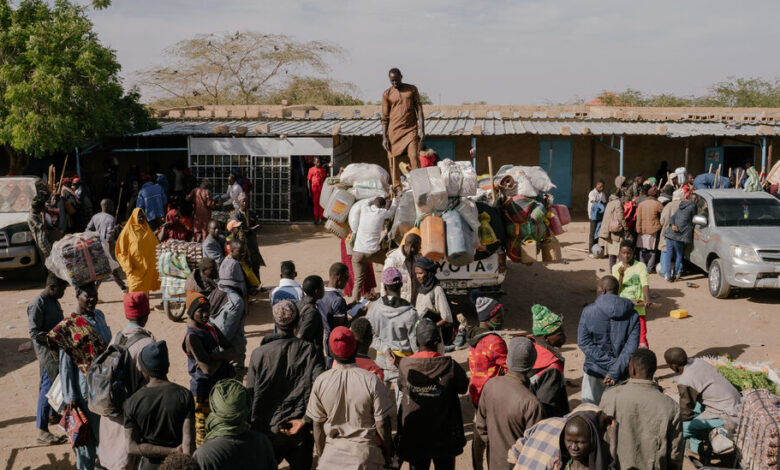Violence, Rape, Thirst, Even Organ Theft: Migrants Face Deadly Risks in Africa

If not left to die of dehydration or disease, migrants on the dangerous overland route through North Africa to the Mediterranean and Europe risk rape, torture, sex trafficking and even organ theft, according to a new report by the United Nations.
Migrant deaths in the Mediterranean have captured global attention over the past decade, but “the number of deaths in the desert could be at least double” those, according to report released on Friday by two United Nations agencies and the Joint Migration Center, a Denmark-based non-governmental research group.
Based on interviews with more than 31,000 migrants along their journeys, from 2020 to 2023, the report documents the brutality suffered by a growing number of people from dozens of countries as they attempt to cross the Sahel and Sahara to flee war, environmental degradation and poverty.
Physical violence, in addition to sexual violence, which the report counted separately, was the most commonly identified risk by migrants. Dangers along the way included arbitrary detention — often to extort money from their families — and trafficking for labor, sex or criminal activity. Migrants reported being tortured and even having their organs removed.
Violence often comes from organized crime gangs and militias, and especially from smugglers who are paid to bring people to Europe. Smugglers often lie to migrants about the dangers they face, demand more money from them once they are far from home, and provide little food, water and other necessities along the way.
“I believe that all the accidents happen at sea,” Teklebrhan Tefamariam Tekle, an Eritrean refugee now in Sweden, told the interviewer. “The accidents happen there, in the Sahara desert. It’s full of Eritrean corpses. You’ll find bones and skulls of people who died.”
Others told of migrants and smugglers simply abandoning those who collapsed from thirst or injury along the way. “You just keep going,” said a man identified as Abraham. “You never look back.”
About a third of the adults interviewed were women, who face particular dangers. By one estimate, 90 percent of women and girls travelling along the Mediterranean route have been raped. United Nations Study 2020, and some were forced into prostitution to pay for their passage. There were reports of women being forced to marry their kidnappers and bear children, and other reports of women being forced to pay for sexual favors to allow a group of people to pass safely.
“The stories are truly horrifying,” said Judith Sunderland, who was not involved in compiling the report but is deputy director of Human Rights Watch’s Europe and Central Asia division and has interviewed hundreds of survivors of the journey to Europe. She said the accounts in the report sounded tragically similar to what she had heard.
“You can’t believe people can be so cruel to each other,” she added. “You can’t understand why people still make these trips, many of them knowing the risks.”
Migrants identified Libya, Algeria and Ethiopia as the most dangerous countries.
According to statistics, in 2024 alone, more than 72,400 migrants crossed the Mediterranean. United Nations Refugee Agencyone of the sponsors of the new report, and at least 785 are known to be dead or missing. But tracking sea crossings is difficult, according to the report’s authors, but estimating how many people attempt to reach Africa’s northern shores after crossing remote, sparsely populated, and often lawless deserts is even harder—and how many disappear along the way.
According to the report, between January 2020 and May 2024, 1,180 people are known to have died while crossing the Sahara Desert, but the actual number could be much higher.
European countries have long tried to deter migrants to varying degrees and have paid countries in North Africa to stop people from crossing the sea. recent investigation A group of news agencies found that in some cases, European governments are paying to train and equip North African security forces to force migrants away from the coast and back into the desert without supplies, putting their lives at risk.
Some of the countries migrants try to cross are ravaged by armed conflict and extreme poverty, or have weak central governments.
The combination of instability and hostility means migrants in Africa have little chance of finding support from authorities or receiving treatment for physical or mental trauma, the report said.
The report, which updates and expands on a report published in 2020, said that since then, “the security situation has deteriorated further in several countries, leading to increased displacement and cross-border movements of people in need of international protection and migrants.”




